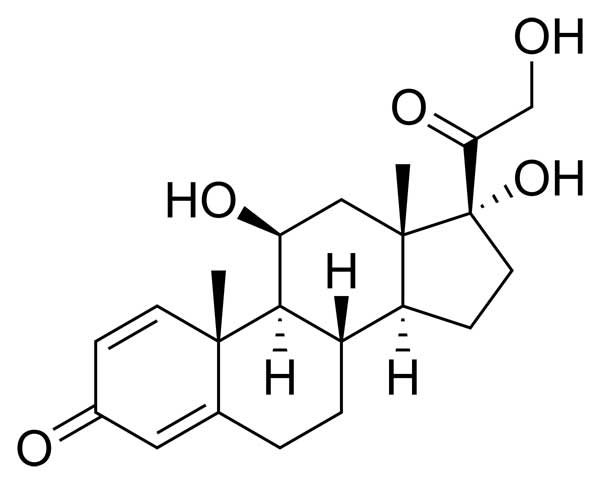on Prednisone is a commonly prescribed corticosteroid medication used to treat a wide variety of inflammatory and autoimmune conditions. Its generic name is prednisone and it goes by brand names such as Deltasone, Liquid Pred, Orasone, and Sterapred. In this comprehensive guide, we will cover everything you need to know about using prednisone – what it is, how it works, dosage information, side effects to watch out for, and safety considerations.

What is Prednisone and How Does It Work?
Prednisone is a synthetic corticosteroid medication that mimics the effects of cortisol, the hormone naturally produced by the adrenal glands. It works by reducing inflammation and suppressing the immune system. Prednisone binds to steroid receptors in the body and impacts gene expression, cell metabolism, and inflammatory pathways to reduce swelling, redness, and immune activity. This makes it an effective treatment for autoimmune disorders like rheumatoid arthritis where the body is attacking itself. It’s also used for other conditions involving problematic immune responses like asthma, COPD, and inflammatory bowel disease (IBD).
Common Uses of Prednisone
Prednisone has many uses across a range of inflammatory, autoimmune, and allergic conditions. Some of the most common uses include:
Rheumatologic
Diseases Prednisone is frequently used to treat inflammatory forms of arthritis like rheumatoid arthritis, psoriatic arthritis, and lupus (SLE). It helps suppress the autoimmune attack on joints and tissues to reduce pain, swelling, and damage. Standard dosage ranges from 5-60 mg daily.
Lung Diseases
For lung conditions like asthma, COPD, bronchiolitis obliterans, and severe allergies, prednisone helps open airways and reduce swelling/mucus production. It can treat acute asthma attacks or prevent flare-ups. Dosages for lung disease range widely from 5 mg to 60+ mg per day depending on severity.
Gastrointestinal Disorders
Prednisone is a common treatment for inflammatory bowel diseases like Crohn’s disease and ulcerative colitis which cause intestinal inflammation. By reducing swelling in the GI tract, it helps improve symptoms of abdominal pain, cramping, and diarrhea. Standard dosage is 40-60 mg daily tapering down over weeks.
Other Uses
Along with the conditions above, prednisone is FDA approved to treat over 50 other diseases including blood disorders like hemolytic anemia, endocrine disorders like adrenal insufficiency, kidney disorders like nephrotic syndrome, neurological conditions, cancer types like lymphoma, dermatologic diseases, vision problems, organ transplant rejection, sepsis, COVID-19, and numerous others. Dosing varies widely depending on which disease it’s treating.
How to Take Prednisone – Dosage Information
Prednisone comes in tablet or liquid formulations. The typical prednisone dosage for adults ranges anywhere from 5 mg to 60 mg per day depending on the medical condition and severity. Higher doses up to 80 mg daily may be used for acute treatment short-term. Extended use requires lower doses to avoid side effects. Here is some general dosage guidance:
Replacement Therapy
For people who don’t naturally produce enough cortisol like in adrenal insufficiency, low dose prednisone around 5-10mg per day replaces what the body can’t make itself.
Shock/Acute
Treatment For sudden serious flare-ups like asthma attacks or acute gout, short-term high dose treatment of 30-80 mg per day in divided doses reduces inflammation fast. This dosage is decreased after several weeks once the flare-up improves.
Maintenance Therapy
For chronic inflammatory diseases, longer term therapy of 7.5-20 mg per day controls symptoms. The dose may be adjusted up or down over time depending on individual response and disease activity.
In all cases, it’s very important to only take the dose prescribed by your doctor, taper usage correctly, and not abruptly stop therapy which can lead to dangerous withdrawal effects. When taking prednisone, swallow it with about half a glass of water on a full stomach to minimize GI side effects. Take it at the same fixed times daily to maintain stable blood levels.
Prednisone Side Effects and Safety Concerns
While prednisone is effective for treating inflammatory conditions, immune suppression does come with short and long-term safety concerns. Monitoring for side effects is essential. Some potential prednisone side effects include:
Short Term Side Effects
- Digestive complaints like nausea, vomiting, and ulcers
- Increased infections due to weakened immunity
- Headaches and dizziness
- Difficulty sleeping and mood changes
- Fluid retention causing swelling in feet/ankles
- High blood sugar and diabetes onset
- Unusual heart rhythms, high blood pressure
Long Term Side Effects
The following may happen with higher doses over longer periods of time:
- Weight gain and puffy cheeks from fluid retention
- Thinning skin and easy bruising
- Cataracts or glaucoma in the eyes
- Osteoporosis weakening bones
- Adrenal gland suppression
- Growth retardation in children
Along with side effects, there are some important safety considerations for specific populations when using prednisone:
Pregnancy and Breastfeeding
Prednisone crosses the placenta and limited pregnancy data suggests it may impact fetal development. Use requires weighing maternal/fetal risk vs benefit. Prednisone is considered compatible with breastfeeding but should be taken right after nursing and monitor infant growth closely.
Fertility Issues
For males on higher doses longer term, prednisone may decrease sperm count and testosterone levels, causing reduced fertility. Fertility generally recovers within a few months after stopping prednisone.
Conclusion
Prednisone can significantly improve symptoms and quality of life for those with inflammatory and autoimmune conditions when used under medical guidance. Starting on an appropriate dose and tapering properly is key to reducing short and long term prednisone side effects. Be sure to take the medication exactly as prescribed, report any troubling reactions promptly to your physician, and get regular lab work done to monitor for complications. Reach out to your doctor with any other questions or concerns about taking prednisone for your specific health condition.
